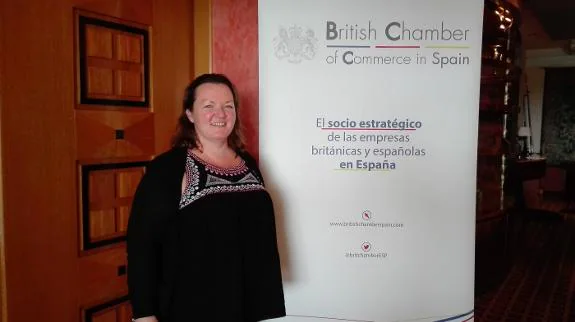"On a day-to-day basis it's business as usual in Catalonia"
The regional vice-president of the BCC in Barcelona explains that the chamber's role is to help members' businesses continue to prosper, despite the uncertain political climate
Rachel Haynes
Viernes, 1 de diciembre 2017, 13:10
Laura Byrne, regional vice-president of the British Chamber of Commerce for Barcelona, was in Marbella this week to attend a breakfast meeting of the Andalucía branch of the organisation, chaired by the local vice-president, Derek Langley.
Byrne, 40, is managing director of Appco Group España, a sales and marketing company she started working for in Spain 17 years ago. Born in Ireland, one of seven children in a family that moved around due to her father's business, she spent her childhood in Portugal, Spain and the UK. It was perhaps being a member of a large, mobile family that contributed to her self-confessed proactive nature which saw her in the role of regional vice-president of the BCC last year, less than three years after she joined the organisation.
What Byrne didn't realise when she took on the role was that she was soon going to have to deal with two major political situations with the potential to disturb the stability of the business market her BCC members work in: Brexit and the Catalan independence process.
She is quick to stress that in both cases the Chamber of Commerce stays away from politics.
What we do for our members, with the Catalonia situation as well as with Brexit, is to avoid speculation, to make sure they have the correct information about what's going on and to put them at ease, explains Byrne, adding that the process has been much faster and more intense with the Catalan situation than with Brexit, when there was more time to deal with issues.
With big banks and other firms moving out of Catalonia when an independence declaration seemed a possibility, small and medium enterprises in the region were offered the support and guidance of the BCC.
We reached out to our members, says Byrne, explaining that if they had queries or were wondering what to do, a panel of experts had been put together to help out.
The idea that society in Catalonia is now divided into those for or against independence certainly does not apply to the business community, says the vice-president.
Business is business, she says; whatever views people may express on social occasions,on a day-to-day basis it's business as usual. The goal is to continue to look after the Barcelona brand and Catalan businesses.
So far the BCC has no data to show the immediate effects of the political situation in Catalonia on business in the region and investment from the UK.
According to the chamber's barometer released recently, British investment had decreased slightly up to the third quarter of this year, but that was too soon to record any consequences of the 1 October referendum and the events that followed.
The barometer did show that the UK is gradually becoming one of the biggest investors in Spain, says Bryne. At the moment British investment is responsible for over 36,000 jobs so it's an important part of the Catalan network, and our goal is to try to maintain that.
Byrne admits that some investments are on hold due to the situation but there are no statistics to show whether British businesses planning to move to Catalonia have changed their plans. The same goes for whether businesses already based in Barcelona have lost clients due to the political turmoil. I know that members have noticed changes in business, but I don't have any data, it's too soon, she says.
The next big date on the calendar is 21 December when regional elections will be held in Catalonia.
Byrne believes that the important thing is for the new government to have a real interest in the Catalan market and in keeping employment growing. We are just coming out of a financial crisis and we don't want to see a region like Catalonia fall into another one, she adds.
No one knows what's going to happen after the 21st, she says. So the best thing to do is to keep the calm, keep things going, business as usual, and work with whatever comes.
